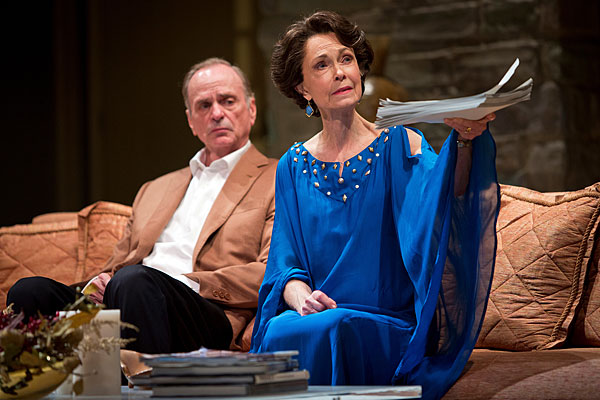
It may be cold outside (okay, freezing), but Deanna Dunagan onstage is a must-see no matter what the temperature. This month, the Tony Award winner hits the Goodman as the matriarch of the Wyeth family in Other Desert Cities (Quick synopsis: Liberal daughter visits Republican parents to tell them about her tell-all memoir that reveals family secrets behind the suicide of her brother Henry). Chicago staffers Emmet Sullivan and Elly Fishman attended the premiere Tuesday night.
Emmet: I’ll be honest, there are very few reasons I want to leave my apartment right now. Other Desert Cities, though, was one of them, based on everything we knew about the play. It’s a Pulitzer Prize-winning drama about the Wyeth family set in a balmy winter in California.
Elly: If we can’t go to the desert, maybe we can live vicariously through a play about it.
Emmet: Hearing Brooke talk about the endless warm weather in Palm Springs did seem to earn a collective groan of jealousy from the audience. So, in your opinion, did it all live up to the hype?
Elly: My review is a mixed bag.
Emmet: What’s in the bag?
Elly: I’ll begin with the good—Deanna Dunagan, as Mama Wyeth, was great. She’s always magic on stage. Her ability to find the acidity in a script and character never fails to delight
Emmet: She was the most consistent actor up there. They are still working out kinks, but some of the actors still tripped over lines or couldn’t figure out the blocking.
Elly: I also though John Hookenakker as her son, Trip Wyeth, was great. He really brought out the awkward comedy in the script.
Emmet: Which was sorely needed at points. Between him and Aunt Silda, they kept the show from being too gloomy.
Elly: I agree about the blocking and honestly, it’s the play itself for me. I was on board for the first act, but the second act just didn’t work. I also felt like Tracy Michelle Arnold as Brooke Wyeth was not the manic enough.
Emmet: I agree about the act disparity. The first act set up a lot of dark paths to go down that the play never really did. It retreated too quickly from its own drama.
Elly: The stakes didn’t feel that high at the climax point. There were some smart, honest moments, but I felt the characters were relatively unoriginal and not nuanced.
Emmet: The villainous Republicans? The drunk relative?
Elly: They felt too familiar—and not in a good way.
Emmet: I felt like we were cheated out of some true moments of humanity. We don’t know what it was six years ago that suddenly broke Brooke.
Elly: The problematic relationships (like Polly’s relationship with her sister Silda) were never fully explained.
Emmet: I don’t get why this took place in 2004. It’s been almost 30 years since Henry’s suicide. Why is this all coming to a head now? What’s changed?
Elly: You mean beyond the fact of the politics and the emergence of the tea party? I think there’s something to be said for an old generation standing idly by as the party becomes increasingly dogmatic.
Emmet: That’s interesting from a writing perspective, to link the two stories—the parents growing older and standing idly by while their children self-destruct, just like older Republicans with their party. But it doesn’t make much sense from a character perspective. Why did Brooke suddenly have a breakdown a few years ago? I assumed for a while that was when the suicide happened, but we learn later it was in the 70s. She had been relatively well adjusted after, even writing a bestselling book, and then something changed and she had to be hospitalized, but they never went into what triggered that breakdown.
Elly: The timeline is a little all over the place.
Emmet: Jon Robin Baitz, the playwright, clearly has a fascination with this time period and this intergenerational conflict—he admits as much in the program (and he’s also behind Brothers & Sisters, a TV show focusing on a politically polarized California family). I thought the story of Henry, though, diluted that message. By the end, we’re so focused on the drama of Henry that we almost forget the parallel theme of a changing of the guard in politics.
Elly: Henry, who we never really have reason to feel invested in. There are gestures about who he was as a kid and later a rebellious drug-crazed teen, but I didn’t feel invested in his story.
Emmet: OK, how about tell me one thing you liked besides Deanna Dunagan.
Elly: I liked the first 10 to 15 minutes of the second act, as the relationship between the siblings unfolded. That felt very real to me.
Emmet: For me, I loved the set, but that was kind of a gimme. I also did love a lot of the comedy in the script—very well placed throughout to keep the show moving. And it did move, especially for being only in one room the entire time.
Elly: That’s true. It’s over the course of one day, and there are a lot of shifts and turns.
Emmet: Final question. You’ve seen Deanna Dunagan now in August: Osage County, A Little Night Music, and now Other Desert Cities. What would you like to see her in next?
Elly: Honestly, I’d see her in anything. Maybe not Cats.
Other Desert Cities runs through February 17 at the Goodman Theatre, 170 N. Deaborn St. For info and tickets, goodmantheatre.org.
Photograph: Liz Lauren


